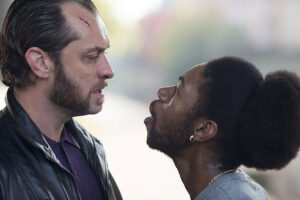Maybe it’s because the studio movies at this time of year are so universally dreadful, but I find myself drawn to the smaller films that bite and snarl and generally have bad manners: “Bad Words,” “The Raid 2” and, this week, “Dom Hemingway.”
Written and directed by Richard Shepard (“The Matador”), “Dom Hemingway” offers us Jude Law in the kind of performance we rarely see from an actor who seems too polite to offer it. Indeed, when we first glimpse the title character, he is in prison, proudly declaiming the universal superiority of his penis to all others. There’s a visual kicker to that joke that truly sets the tone for the film, but let’s not spoil that.
Dom is a London safecracker, set free after a 12-year prison stint. He took the fall for his boss, Mr. Fontaine (Demian Bichir); his sentence cost him his wife, who divorced him to marry another man, then died of cancer. Dom has a daughter he barely knows – and an appetite for debauchery that seems bottomless. He and his best mate Dickie (Richard E. Grant) travel to the French countryside, where Mr. Fontaine will award Dom his share of the job for which he was busted: several hundred thousand Euros.
But nothing is ever simple for Dom, whose motor-mouth and self-destructive impulses pop him in and out of trouble. Shepard’s script gets a little digressive at times but is never less than entertaining, thanks to pointed dialogue and a world-beating performance by Law, who turns Dom into a force of nature akin to a tsunami. It’s wildly funny, delightfully stylized and brutally violent at times. You’ll never be bored.
The same can’t be said for “Captain America: The Winter Soldier,” a bit of franchise plumping from the Marvel stable. It’s an improvement over 2011’s “Captain America: The First Avenger,” but, at almost two-and-a-half hours, it’s easily an hour too long.
Set in the present day, it features the 1940s-era super-soldier (Chris Evans) working for Nick Fury (Samuel L. Jackson) and SHIELD in the present. But a successful mission to recover a tanker leads to friction between Fury and Cap – which ends when there is an attempt on Fury’s life back in Washington. Before he knows it, Cap is at the top of the most-wanted list, on the run with the Black Widow (Scarlett Johansson), uncovering a plot to turn the American intelligence apparatus inside out in the name of preventing crime.
The final half hour of this film – directed by brothers Joe and Anthony Russo (“You, Me and Dupree”) – is staggering in its scale and visual imagination, producing the only real excitement and tension of the movie. Too much of the first two hours, unfortunately, is dedicated to action scenes that are merely gunplay. When no one with a gun can ever hit the one guy who doesn’t have a gun, the suspense goes right out of the film.
(A question: When you’ve got three guys with automatic weapons shooting at Captain America as he runs toward them behind his shield, why do they always seem to aim for his shield? He’s not so fast that one of them couldn’t take a second to recalibrate his aim and shoot at Cap’s legs. Captain America isn’t even looking where he’s going because his head is behind the shield, so he won’t see them change their aim and adjust accordingly. Again, a real excitement killer.)
What is Robert Redford doing in this movie? That’s a good question; he’s fine in his role (and you’ll figure out what that is pretty quickly) but the character itself is decidedly colorless. He’s believable as a zealous government official, but he needs something more, something with more dimension than the script gives him the chance to explore.
There is so much noise and movement in “Captain America 2” – and yet it doesn’t have an iota of the feeling and thoughtfulness of Anthony Chen’s debut feature, “Ilo Ilo.” An arthouse tale from Singapore, it’s the story of a family trying to cope with the economic downturn that blasted Asian markets in the late 1990s.
This review continues on my website.

